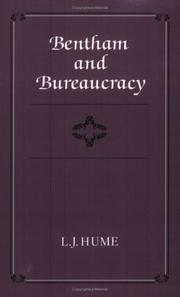| Listing 1 - 3 of 3 |
Sort by
|

ISBN: 0521235421 052152606X 0511608977 9780521235426 9780511608971 9780521526067 Year: 1981 Publisher: Cambridge Cambridge University press
Abstract | Keywords | Export | Availability | Bookmark
 Loading...
Loading...Choose an application
- Reference Manager
- EndNote
- RefWorks (Direct export to RefWorks)
Most accounts of Jeremy Bentham (1748-1832) deal with him as a prophet of either utilitarianism or of liberal democracy. This book discusses a less familiar but very important aspect of his political thought: his theory of how government institutions should be organised in order to function as efficient and yet responsive guardians of the community's interests. It thus focuses on his programme for he executive and judicial branches of government rather than for the legislature and the electorate. Dr Hume suggests that eighteenth-century political thought was richer in ideas about government that has usually been allowed, but that Bentham's special qualities of mind enabled him to widen and deepen those ideas much further than his contemporaries could have foreseen.
State, The --- Bureaucracy --- Bentham, Jeremy --- Contributions in Political science --- #SBIB:IO --- #SBIB:321H50 --- #SBIB:35H006 --- Administration --- Commonwealth, The --- Sovereignty --- Political science --- Interorganizational relations --- Public administration --- Organizational sociology --- Westerse politieke en sociale theorieën vanaf de 19e eeuw: liberalisme --- Bestuurswetenschappen: theorieën --- -ベヌサム --- ベンサム --- 벤담 --- Bureaucracy. --- State, The. --- -Contributions in Political science --- Bentham, Jeremy, --- Bentam, Ieremi︠a︡, --- Bentam, Dz︠h︡eremi, --- Bentham, Jeremías, --- Bentham, Jérémie, --- 邊沁, --- Arts and Humanities --- Philosophy --- Bentham, Jeremy - Contributions in Political science
Book
ISBN: 0814734162 Year: 1981 Publisher: New York (N.Y.): New York University press
Abstract | Keywords | Export | Availability | Bookmark
 Loading...
Loading...Choose an application
- Reference Manager
- EndNote
- RefWorks (Direct export to RefWorks)
330.34 --- Economics --- -Keynesian economics --- -Marxian economics --- -Austrian school of economics --- -#SBIB:321H50 --- Austrian school of economists --- Marginalist school of economics --- Schools of economics --- Marginal utility --- Marxist economics --- Communism --- Socialism --- Post-Keynesian economics --- Economic theory --- Political economy --- Social sciences --- Economic man --- Economische ontwikkeling. Regionale economische ontwikkeling --- History --- Westerse politieke en sociale theorieën vanaf de 19e eeuw: liberalisme --- 330.34 Economische ontwikkeling. Regionale economische ontwikkeling --- Austrian school of economics --- Keynesian economics --- Marxian economics --- #SBIB:321H50
Book
ISBN: 0520040600 9780520040601 Year: 1981 Publisher: Berkeley, Calif.
Abstract | Keywords | Export | Availability | Bookmark
 Loading...
Loading...Choose an application
- Reference Manager
- EndNote
- RefWorks (Direct export to RefWorks)
316.2 WEBER, MAX --- Historical sociology --- History --- -Political science --- -Rationalism --- Religion and sociology --- #SBIB:1H54 --- #SBIB:321H50 --- Religion and society --- Religious sociology --- Society and religion --- Sociology, Religious --- Sociology and religion --- Sociology of religion --- Sociology --- Knowledge, Theory of --- Religion --- Belief and doubt --- Deism --- Free thought --- Realism --- Administration --- Civil government --- Commonwealth, The --- Government --- Political theory --- Political thought --- Politics --- Science, Political --- Social sciences --- State, The --- Annals --- Auxiliary sciences of history --- Anthropology --- Sociologische richtingen. Sociologische scholen. Sociologen--WEBER, MAX --- Philosophy --- Filosofie van de Hedendaagse tijd (na 1830) --- Westerse politieke en sociale theorieën vanaf de 19e eeuw: liberalisme --- Weber, Max --- ウェーバー --- 316.2 WEBER, MAX Sociologische richtingen. Sociologische scholen. Sociologen--WEBER, MAX --- Weber, Max, --- Political science --- Rationalism --- Political philosophy --- History, Modern --- ウェーバー, マックス --- Ma-kʻo-ssu Wei-po, --- Makesi Weibo, --- Pebŏ, --- Pebŏ, Maksŭ, --- Vēbā, Makkusu, --- Veber, Maks, --- Vemper, Max, --- Webŏ, Maksŭ, --- Wei-po, Ma-kʻo-ssu, --- Weibo, --- Weibo, Makesi, --- ובר, מאקס, --- ובר, מאכס --- ובר, מקס --- 韦伯, --- History - Philosophy --- Political science - Philosophy --- Weber, Max, - 1864-1920
| Listing 1 - 3 of 3 |
Sort by
|

 Search
Search Feedback
Feedback About UniCat
About UniCat  Help
Help News
News